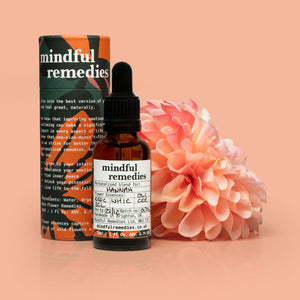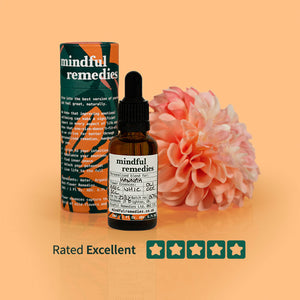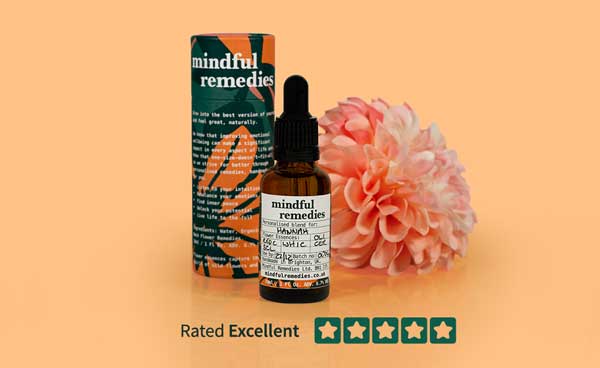your basket
- choosing a selection results in a full page refresh

There is no one-size-fits-all approach to treating OCD, as the disorder can manifest in different ways from person to person. However, some people find that flower remedies can be a helpful and natural way to support them in their journey to overcome OCD. In this blog post, we will explore the benefits of using flower remedies for OCD, as well as how you can go about finding the right remedy for you.
OCD, or Obsessive Compulsive Disorder, is a mental disorder that is characterised by repetitive, unwanted thoughts (obsessions) and/or behaviours (compulsions). People with OCD often have difficulty controlling their obsessions and compulsions, which can interfere with daily activities and cause significant distress. OCD typically begins in childhood or adolescence, but it can also develop in adulthood.
People with OCD often feel that they need to perform their compulsions in order to prevent something bad from happening. For example, someone with OCD might wash their hands over and over again because they are afraid of getting sick. OCD can have a major impact on a person's life, making it difficult to work, go to school, or even leave the house.
There is no one-size-fits-all treatment for OCD, but many people find relief with medication, therapy, natural remedies or a combination of them all. If you think you might have OCD, it's important to talk to a mental health professional who can help you get the treatment you need. It is important to seek treatment for OCD as soon as possible, as it can be a very debilitating disorder. However, with proper treatment, people with OCD can improve significantly and live healthy, productive lives. Here are some of the common treatments for OCD...
The most common type of treatment is cognitive-behavioural therapy (CBT), which helps people to identify and challenge the negative thoughts and behaviours that are at the root of their OCD.
Exposure and Response Prevention (ERP) is another evidence-based treatment for OCD. ERP involves gradually exposing patients to their feared situations or objects while helping them to resist the urge to engage in their compulsive behaviours.

The most commonly prescribed medications for OCD are selective serotonin re-uptake inhibitors (SSRIs), which work by increasing levels of the neurotransmitter serotonin in the brain. SSRIs are generally well tolerated, but they can cause side effects such as nausea, diarrhea, and insomnia. Other medications that may be used to treat OCD include tricyclic antidepressants and antipsychotics.
When it comes to health and well-being, more and more people are turning to natural remedies. There are many advantages to using natural remedies, including the fact that they are gentle on the body and less likely to cause side effects than their synthetic counterparts. Furthermore, natural remedies often work with the body's natural systems, rather than against them. With so many benefits, it's no wonder that natural remedies are gaining in popularity.
Mindfulness meditation is another great way to calm the mind and ease OCD symptoms. A few minutes of mindfulness each day can help to break the cycle of obsessive thoughts and compulsive behaviours.
Bach flower remedies are a natural form of healing that dates back to the 1930s. They are based on the idea that there are 38 different emotional states that can cause disharmony in the body, and that each of these can be remedied by a specific flower essence. The remedies are made by infusing flowers in water and then sun-drying or boiling them, and they can be taken orally or used topically. Proponents of Bach flower remedies believe that they can help to treat conditions like anxiety, stress, and depression, as well as physical symptoms like headaches and fatigue. While there has been little scientific research to support the efficacy of these remedies, many people find them to be a safe and gentle way to improve their well-being.
At Mindful Remedies we offer the ability to create your own personalised flower remedy blend choosing up to seven flower remedies in a treatment bottle. If any of the remedies below resonate with you, simply click on the buttons below to add them to your treatment bottle.
There are two flower remedies that may be helpful for people with OCD: Crab Apple and White Chestnut, which we describe in more detail delow.

Crab Apple is the cleansing remedy. It is for people who are self loathing or have self disgust. They often have feelings of being unclean or that there is something dirty about themselves, either physically or mentally. This remedy will help to cleanse their mind of these unwanted thoughts.
People who need Crab Apple can often externalise their negative thoughts patterns outwardly by becoming obsessive compulsive cleaners either ensuring their house is immaculate or obsessively cleaning their body or their hands. They have an inner desire for purity. They can become obsessed with seemingly minor things.

White Chestnut is for overthinking and an overactive mind. If you or a loved one suffer from intrusive thoughts, obsessive thoughts or ruminating OCD, White Chestnut may be able to help. People who need White Chestnut are subjected to a mental torture with persistent thoughts or worries that won't go away, constantly running through their mind, leaving them unable to focus and escalating worries or anxieties. It can also lead to insomnia as these constant thoughts leave the person unable to sleep. The White Chestnut remedy will help you to organise your thoughts and to calm your overactive mind.
We use the Original Bach flower remedies to create your bottle, handmade by an experienced practitioner. We also ship worldwide.
If you have anxiety alongside OCD, you might want to read our blog post on flower remedies for anxiety for suggestions on potential anxiety remedies that might help naturally.
OCD can also co-exist alongside depression, in which case we also have a blog post for flower remedies for depression which may be of some help.
If you'd like to try flower remedies as a natural treatment for OCD, at Mindful Remedies you can create your own personalised flower remedy with up to seven flower remedies in a bottle. You can self-select from any of the 38 flower remedies available. Alternatively, you might want to consult with a Bach flower practitioner who will be able to provide more expert advice tailored to your specific situation.
Whatever treatment plan you decide to follow, we wish you all the best.

Since 2021, Lucy Edwards, a qualified Bach Flower Practitioner and the driving force behind Mindful Remedies, has connected with clients across the world. Crafting thousands of personalised remedies, Lucy has supported individuals' emotional wellbeing, shipping remedies to far-flung places like the USA, Thailand, and Australia.
Lucy is readily available for conversations, offering personalised advice to guide you on the path to holistic wellness. It's important to note that she's not only qualified but also registered with the Bach Centre, ensuring that every consultation and remedy adheres to Dr Bach’s original guidelines for expert care and efficacy.
Exclusive pricing 20% off your first subscription order and 5% off all future orders
VIP treatment Receive personalised advice from Lucy, free gifts & 15% off gift vouchers
Easy to manage Edit remedy, change schedule, pause or cancel at any time
Exclusive online workshops Access to workshops focusing on emotional wellbeing, guided by Lucy
Early access to new products Be the first to try out new remedies or wellness products, before anyone else



